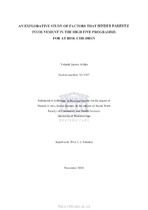An explorative study of factors that hinder parents’ involvement in the High Five Programme for at risk children
Abstract
A qualitative study was conducted to explore and describe the factors that hinder parent involvement in the High Five Life Skills Programme for at risk children. Parent involvement remains a challenging phenomenon, which affects not only the child, as an individual, but also the family in society. However, although parenting children is perceived to be an important responsibility, parents do not receive any formal training on how to be good parents.
An explorative and descriptive research design was utilised. Data collection was done by means of semi-structured interviews and focus group discussions, with the parents/guardians and children in the High Five Life Skills Programme, as well as the teachers, who refer children to the programme. The method of non-probability sampling, employed in this study was purposive sampling. The sample was selected on the basis of the researcher’s own knowledge, as well as the purpose of the study. Data were analysed using the nine steps proposed by Creswell.
The results highlighted six barriers that hindered parent involvement in the High Five Life Skills Programme, namely, Low self-esteem of parents/caregivers and children; Lack of communications between all relevant parties - caregivers, teachers and the facilitators of the High Five Life Skills programme; Lack of role models: Parents’ not being role models as their own negative behaviour hindered their involvement; Lack of an emotional bond between parents and children, coupled with absent fathers; Lack of parents’ parental skills and support networks; and the lack of resources and support with transport to and from meetings, as well as child care for younger siblings. The participants, especially the children, freely expressed themselves, and contributed to the results; thereby assisting the researcher to explore the barriers that hinder parent involvement in the High Five Life Skills Programme.
It is anticipated that the results of this current study will form a basis for the High Five Life Skills Programme to develop strategies that respond to the needs of the parents and children involved in the programme.

